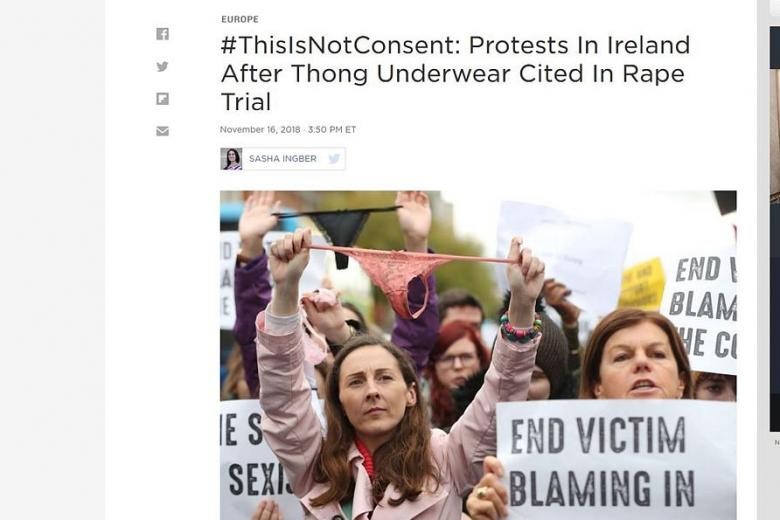Uproar after barrister makes victim-blaming comments in Irish court

Does wearing a thong mean that a woman is consenting to sex?
This was what a defence lawyer in Cork, Ireland, implied in defending a man, 27, accused of raping a 17-year-old girl.
The Irish Examiner reported that Senior Counsel Elizabeth O'Connell said in her closing remarks of the rape trial earlier this month: "Does the evidence outrule the possibility that she was attracted to the defendant and was open to meeting someone and being with someone?
"You have to look at the way she was dressed. She was wearing a thong with a lace front."
She showed a thong, a piece of underwear with a strip of fabric at the back that exposes the buttocks, to the jury of eight men and four women.
The jurors deliberated for 90 minutes before unanimously acquitting the accused.
Ms O'Connell's argument and the acquittal sparked outrage in Ireland as hundreds of people took to the streets in protest.
[embed]https://twitter.com/Starlanna/status/1061417111636135941[/embed]
It also led to a global movement of women posting pictures of their thongs on social media with the hashtag #ThisIsNotConsent.
In Singapore, the Association of Women for Action and Research (Aware) joined in condemning the practice of victim-blaming in sexual assault cases.
When contacted by The New Paper, Aware's head of advocacy and research, Ms Shailey Hingorani, said Singapore is not spared from "this dangerous belief" of victim-blaming.
She noted that many survivors in Aware's Sexual Assault Care Centre did not seek support or report sexual crimes against them because of negative reactions they had received from their friends, family and even professionals.
"Consent does not come in the form of a piece of cloth or a dress. It has to be freely and voluntarily given by each person involved," Ms Hingorani said.
"Survivors have been assaulted wearing anything from their pyjamas to school uniforms. Sexual assault is not about a woman's clothing.
"It is a choice that a perpetrator makes to disregard someone's consent and autonomy over their own body."
[embed]https://twitter.com/BethMohen/status/1063384937066389504[/embed]
Ms Claire McFarlane, the founder of Footsteps To Inspire - a global campaign to raise awareness for victims of sexual assault - lamented that victim-blaming is common.
The rape survivor told TNP: "We need to stop finding excuses to justify rape and instead ask the rapist why they chose to force another person into a sexual act, why they hurt another person.
"Rape and sexual violence are abuse of power, they have nothing to do with sex. When a sexual act is forced on another person and they don't want it, it is rape. It is as simple as that."
[embed]https://twitter.com/ibelieveher_ire/status/1062725796291375104[/embed]
Ms McFarlane, who was in Singapore in March last year to support sexual assault survivors, added: "The world needs specialised sexual violence courts. Victim's rights must be protected during a court hearing."
Condemning Ms O'Connell's remarks as inappropriate, copywriter Chloe Tong, 25, said: "Women, including myself, wear thongs for many reasons besides attracting a sexual partner. Thongs are very discreet under clothing, and they are easy to wash and fast to dry."
A student who wanted to be known as Ms Ting feels it is hard to change mindsets in a conservative society like Singapore.
"Dressing skimpily may draw negative comments from people and undesirable attention, and could put the person in an unwanted situation," she said.
This article was first published in The New Paper. Permission required for reproduction.